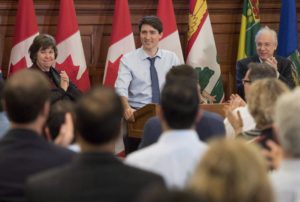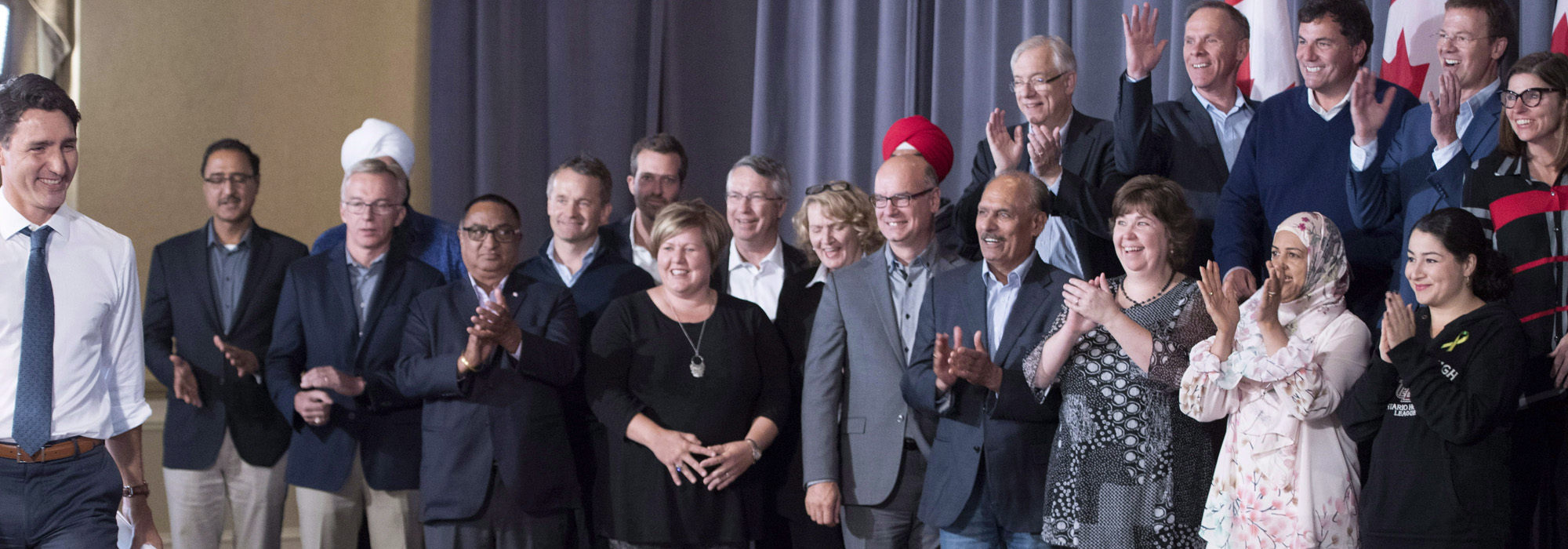
A burning question for observers of the SNC-Lavalin affair is whether former cabinet ministers Jody Wilson-Raybould and Jane Philpott, who publicly opposed actions of their government, will be cut loose from the Liberal caucus. While some, including former deputy prime minister Sheila Copps, urge retribution, others in the party admire these MPs and want them to stay on. Whatever the pair’s political future, my research around party discipline suggests they can expect some rough treatment and career drudgery in the Liberal caucus.
Over the past year, I have had the privilege of interviewing 125 current and former politicians and political staff for a book I am writing about how party discipline has intensified in Canada in recent years. A common theme raised by current and former members of cabinet, party leaders, party whips, private members and political staff is that everyone affiliated with a political party identifies as a member of a team. They form bonds as they go on a journey together to realize common goals. Sparring with adversaries occurs with the confidence that teammates have your back. Members understand they must never be a public distraction for the team leader.
Here are snippets of what some current MPs told me in the months before the SNC-Lavalin story:
In a government caucus, there are those in cabinet, and there are those working hard to join it. Backbenchers know that when they go astray of a certain whipped vote, it doesn’t help their ambitions. We keep saying this is a team sport, but the House of Commons was not set up to be a team sport. — Liberal MP
To rise above the party positions and the leadership’s positions that got you elected is a form of narcissistic conceit. For you to go out against the party line on something, guess what? People aren’t going to vote for you because you’re bucking the party line. It might be once in four years that you can take a different position. — Conservative MP
When I got elected, I naively expected that caucus was the place where MPs could have a free and frank discussion of issues of the day. The biggest single disappointment upon becoming an MP was finding that caucus meetings were structured to begin with the head table sort of providing us with our marching orders. — New Democratic Party MP

Within a political team, there is considerable deference to authority, and individual behaviour conforms to social and institutional norms. Many backbenchers — that is, members who are not part of cabinet — find national caucus meetings to be stifling rather than enlightening. The leadership says they should come to the microphone to share opinions, but there is so much fear that people bottle things up. They loathe the watchful eyes of powerful staff in the leader’s office and who appear to lack respect for the elected.
Some parliamentarians get annoyed that the party leadership, through the whip, seeks to influence behaviour by deciding on their assignments to particular committees, vetting their requests to be away from Ottawa, authorizing participation on parliamentary junkets and generally controlling who gets to speak in the House. A backbencher has shockingly little policy influence. Staying silent in caucus meetings, staying away from a vote in the House, offering no public comment and declining to share social media posts are the most common ways for them to publicly express dissent — except that in a political team a backbencher’s silence is equated with support.
Backbenchers are unfairly derided by pundits as trained seals who mindlessly follow their masters’ orders. In reality, they are interesting people who get involved in party politics hoping to make a difference. But too often independent thinking does give way to a team mentality. The transformation begins the moment they sign a “values contract” when they want to be nominated as party candidates. The contract is signed during the candidate vetting process to screen out people who might attract negative attention during a campaign and those unwilling to commit to the party’s core values, such as the principles articulated in the party constitution. The team ethos is reinforced through a daily barrage of digital messages, including hashtags that emphasize the team leader (such as #TeamTrudeau).
Fantastic turnout at our #ScarbTO North Federal Liberal AGM – looking forward to working closely with the newly elected executive, enthusiastic team of dedicated @liberal_party members, supporters & volunteers as we seek re-election in 2019! #TeamTrudeau pic.twitter.com/bZ1Mj82zI9
— Shaun Chen (@Shaun_Chen) March 17, 2019
Most government backbenchers settle into a morale-zapping role of repeating approved messages, of jostling for the opportunity to speak in the House, of lobbying ministerial staff and of a public image as government cheerleaders. Those who want to be promoted cooperate with the leadership. Others focus on helping constituents with casework. Team players know not to stray too far from the party line in public.
It appears that Wilson-Raybould and Philpott are less inclined to obey the normal rules of conduct for members of a governing party’s caucus. The corresponding erosion of trust between them and their Liberal colleagues, especially those holding positions of power, will likely cause them to be marginalized.
The worst part of being on the outs with the leadership is not the lost perks or privileges. In my interviews, current and former politicians informed me that the truly horrible bit is how political teammates treat nonconformists. Many members of a political team who praise ministers feel a duty to shun outcasts. Hardcore partisans and leader loyalists will be furious and/or deeply disappointed. Some will keep a distance so as not to jeopardize their own prospects of promotion. It can be difficult to distinguish them from those who find the whole matter too awkward to deal with.
The stories that some politicians across Canada shared with me about the downsides of team discipline are disconcerting. Social shunning can be very painful for those on the receiving end: a lack of eye contact, avoided conversation, people sitting on another side of the room, not being invited to come along for lunch or a drink, and so forth. Outside of caucus meetings, people in positions of power communicate their seething displeasure by ignoring phone calls and being slow to respond to messages. Fortunately, some parliamentarians who disagree with a renegade’s actions will nevertheless go out of their way to be kind, which is a pleasant contrast to those who hide behind a mask of fake smiles. But for the most part, being socially ostracized within a political team is the hardest part of going rogue — and the hurt is largely internalized because the timeworn principle of caucus confidentiality means the poor treatment cannot be publicly discussed.
Occasionally, independent thinkers bristle at the confines of party affiliation. Usually mavericks are lone wolves who gradually became isolated from the team. Months of fruitless internal agitation and social pinpricks erupt in a public outburst that marks the end of the parliamentarian’s time with the party. Those who can’t stomach the public worship of their party leader and the party line have a few options available to them: they can wait until someone else takes the helm; they can wreak havoc internally through various forms of civil disobedience and destabilizing the leader’s authority; they can sit as independents; cross the floor to another party; or relinquish their seat. On occasion a cluster of dissidents leave together to form their own parliamentary group to express a leadership breakdown, such as the Democratic Representative Caucus that split from the Canadian Alliance in 2001 or Québec Debout, which splintered off from the Bloc Québécois in 2018.
Much ink has been spilled in recent years about power imbalances in politics. In January 2018, Minister Patty Hajdu said in the House of Commons that “Parliament Hill features distinct power imbalances…It is a place where often the victimized individual is blamed for the harassment that she herself has experienced.” Still, very little is known about mobbing behaviours toward backbenchers within parliamentary caucuses. Understanding these dynamics is important, because a strong, healthy democracy requires that a diversity of points of view can be safely expressed.
The power imbalances in a governing party’s caucus are stark, given that a prime minister controls upward mobility. It is especially disconcerting when backbenchers affiliated with a governing party are portrayed as troublemakers when they question those in positions of authority. Canada’s system of responsible government fails when backbenchers in a majority government do not hold the cabinet and senior political staff to account.
Encouraging backbenchers to repeat government messages and to refer to “our government” fosters a mistaken identity. Backbenchers need reminding that they are not the government. Probing, pestering, seeking information, offering suggestions, arguing, saying no — these are all things that backbenchers should be regularly doing in a respectful manner. The stars of any political team need to accept that they will be held to account, and they should offer meaningful opportunities for this to happen. They should offer clarity about what would go too far.
Political leaders say that caucus is the place to voice concerns, but in reality caucus is a structure that rewards conformity and frowns on disruption. Ministerial caucus advisory committees used in the Ralph Klein government in Alberta and adopted by Prime Minister Stephen Harper are noteworthy mechanisms that require ministers to engage in meaningful consultation with the caucus. But ensuring that caucus is a safe space for colleagues who challenge authority is another matter.
It would take someone with a strong backbone to advocate for minimum standards for how all members of a caucus should be treated, particularly ways to protect those involved in a reasonable disagreement with the team leader. Perhaps certain Liberal MPs — if they are not ousted from caucus — will explore culture change from within.
Photo: Prime Minister Justin Trudeau receives a standing ovation from caucus members as he speaks at the Liberal national caucus meeting on Parliament Hill in Ottawa on Jan. 28, 2018. THE CANADIAN PRESS/Justin Tang
Do you have something to say about the article you just read? Be part of the Policy Options discussion, and send in your own submission. Here is a link on how to do it. | Souhaitez-vous réagir à cet article ? Joignez-vous aux débats d’Options politiques et soumettez-nous votre texte en suivant ces directives.








